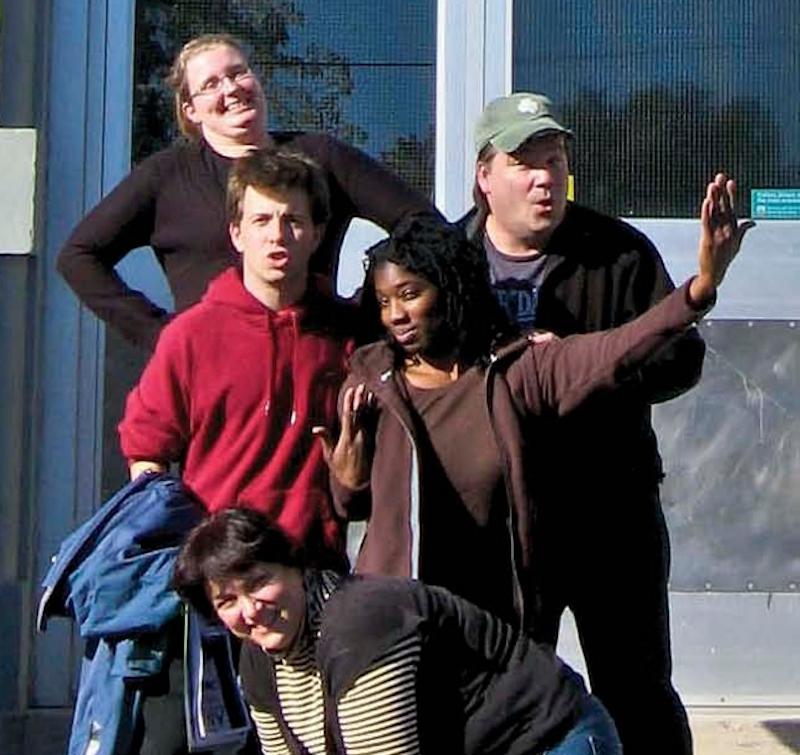
Imagining Poverty: ETFO’s Professional Learning Projects: the Play’s the thing: Danny Starts a Conversation
There is a great deal of research that shows that live theatre touches the children’s imagination with an immediacy that is real and emotional and that its complexities engage students’ critical thinking.1
When we were looking for a way to start the dialogue on poverty and student achievement, we found that the award-winning play written by David S. Craig, Danny, King of the Basement, was a perfect fit for our purposes. Along with Robert Morgan, David Craig is a co-artistic director of Roseneath Theatre, a Toronto-based theatre company for young people. Together they have written more than 20 plays, which have been seen by audiences across Canada and around the world. They have won numerous awards.
In developing their plays, the authors create dissonance by pushing children to question a character’s values, behaviour, and choices. They believe that the interaction between a play’s audience and its characters is an active process (not passive, as it is when watching television), mainly because theatre asks the audience to sit in judgement as the play’s characters make choices or reveal themselves. “Theatre is an experience of community,” says David Craig. “We gather together to watch something of ourselves.”2
Danny is a funny and touching play about an 11-year-old boy and his mom, Louise. They have moved eight times in two years because Louise can’t find a steady job and is often unable to pay the rent. Danny has developed a rich and wonderful fantasy life to help him cope with the transient nature of his life. Danny doesn’t have much food, warm clothing, or education but he is rich with imagination as a means of self-preservation and attracting new friends.
When Danny moves into a basement apartment in a middle-class neighbourhood, the kids he meets seem to have way more problems than just being hungry. Upstairs lives pampered Penelope, who takes taxis to her ballet lessons and gets her expensive corn rows done in a salon and whose warring separated parents won’t talk to each other. Next door lives Angelo, with his rage-filled unemployed father and a mother who works two jobs. Danny turns life into a game of disguise and makes his neediness appear to be “cool.” His sense of play creates a sense of community that allows Penelope and Angelo to cope with their problems and ultimately to help Danny get a home. By building a community Danny shows how friendship can change lives.
Danny, King of the Basement identifies almost every hurdle that children living in poverty might face.3 The play creates an opportunity for the audience to examine and understand the lives of those in poverty, dispelling myths and assumptions. As the play toured across Ontario for 10 weeks in the fall of 2007, it started conversations among teachers, students, and community partners, about important social issues like homelessness unemployment, single parenting, literacy, and poverty.
Every school that hosted the play received a teacher’s guide with suggested pre-performance and post-performance classroom activities. One such activity asks Junior students to create a budget that allows them to live on $900 a month. The students decide how much to spend on rent and food and create a shopping list with essentials and extras for a week. Students quickly learn how challenging this is and become sensitive to the economic conditions some families live with.
If the intent of theatre is to open young minds and hearts and validate the common experiences and challenges facing today’s children, who are growing up in an increasingly complex world, Danny King of the Basement achieved that. If theatre is an outstanding teaching tool to motivate student learning, stimulate an interest in reading, and get young people thinking and talking about themes, issues, and values that are important in their lives, Danny, King of the Basement accomplished that too. The play reminded teachers that when they develop strong, positive relationships with students, they can reinforce self-esteem, academic competence, and problem-solving skills, which can help students transcend life’s uncertainty and injustice.
The ETFO tour of Danny, King of the Basement opened doors for discussion rather than providing answers. It gave students and teachers a great opportunity to think about the issues of poverty, and deal with them in the safe zone of the world of the play. All this resulted from 50 minutes spent sitting on a gymnasium floor experiencing what many have valued and experienced for years – the exciting world of theatre.
Notes
1 David Booth and Kathleen Gallagher, How Theatre Educates: Convergences and Counterpoints. Toronto: University of Toronto Press, 2003. See, in particular, Maja Ardal “Theatre for Young Audiences and Grown-Up Theatre: Two Solitudes.” pp. 191-197. William McDonnell and Dominic Shellard. Social Impact Study of UK Theatre. Commissioned by Arts Council of England, the Scottish Arts Council, and Arts Council Wales, July 2006. Available at artscouncil.org.uk/publications/
2 Jim Giles, “The Importance of Children’s Theatre in Elementary Schools.” ETFO Voice, Winter 2001, p. 12.
3 Anne Golden, Taking Responsibility for Homelessness – An Action Plan for Toronto. Toronto: Report of the Mayor’s Homelessness Action Task Force, City of Toronto 1999.
